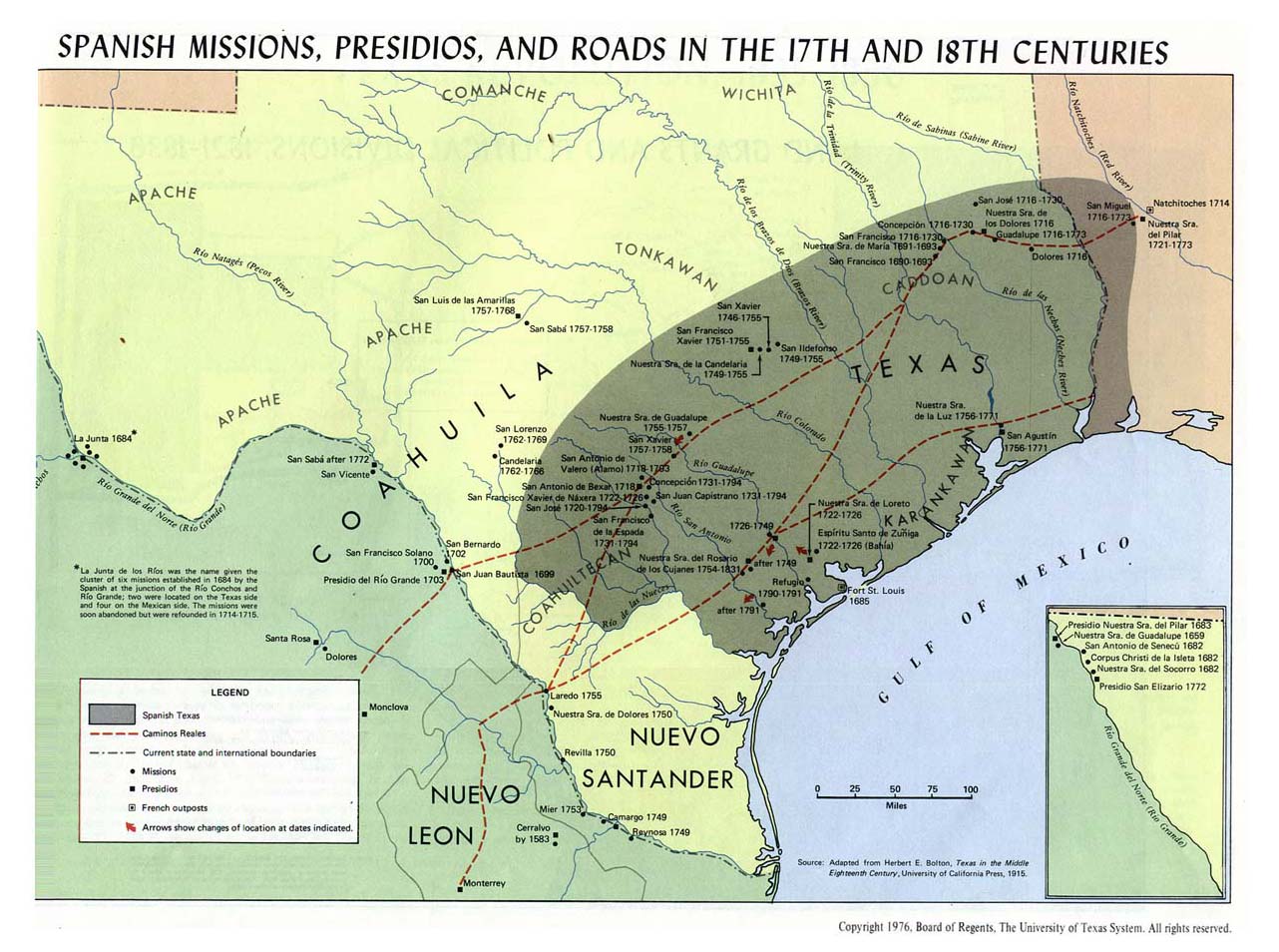7 Slave Sales Reported in Spanish San Antonio

Slave Records filed at San Antonio de Béjar. These are from the files of the Spanish archives of Texas. These documents described the sale of slaves in Spanish colonies, including Texas and Nuevo León.
At the real of Santiago de las Sabinas, in the jurisdiction of the Nuevo Reino de León, on the eleventh of April, 1788, before me, Don Luis María de Yparraguirre, lieutenant alcalde mayor and captain of war for this aforesaid town and its territory, and before the participating witnesses who will be indicated, there appeared in this, my tribunal, the person of Don Jose Vicente Lozano, a citizen of this town, whom I certify to know. He said that he was granting and selling by royal sale to Don Ysidro Treviño, a citizen of the town of Boca de Leones, a mulata slave woman, raised in his own house, called María del Carmel Ramirez.
She of Moorish color, twenty-one years of age, and has no illness other than being pregnant, with no disease whatsoever. She was offered under the circumstances and conditions which are stated above in this document, issued on the eleventh day of the present month of April, at the price of one hundred sixty pesos in common gold, which [Lozano] received to his satisfaction, it having been delivered to him in its entirety in the presence of myself, the aforesaid magistrate, and of the participants and my attesting [witnesses]. He declared that this is the fair value of the aforesaid mulatto slave woman, and that if the afore-named mulatto woman be worth a higher price, he will make a pure and perfect gift of her added value to the buyer. And said Don Jose Vicente Lozano declares that he renounces all the laws of royal regulations, and for greater assurance and greater validity at that price, he obligated and does obligate his person, as well as whatever may be recognized as his property, current and future. And under said obligation, he formalized it according to law, under the clause judicio fisci judicatum solvi (bond for payment), along with all the other customary clauses. From “this day forth, forever, he relinquishes his power and desists from the rights of patronage, possession, and command which he had over the aforesaid slave woman. He cedes, renounces, and transfers all to the aforesaid buyer and to whomsoever might represent his interests, so that this woman will be his slave and will be subject to his service. Having her as such, he may sell or dispose of her according to his will, such that he will not be subject to any suit whatsoever in that regard…Instrumental witnesses were Don Cayetano Dominguez, Don Blas María Dominguez, and Don Jose María Ibarra… Witnesses: Luis Marla de Yparraguirre, José Ramon de las Casas, José Vicente Lozano, Pedro Flores, April 11, 1788.
“Slave Sales,” Spanish Archives of Texas, Dolph Briscoe Center for American History, The University of Texas at Austin, Box 005113.
https://www.cah.utexas.edu/projects/bexar/gallery_doc.php?doc=e_bx_005113
Slave Sale in San Antonio
On January 24, 1792, be it known by this letter that I, Julian de Arocha, a citizen as I am of this villa of San Fernando and royal presidio of San Antonio de Bexar, declare that I am selling and giving in royal sale to Jose Granados, a soldier and squad corporal of the company of the aforesaid royal presidio of San Antonio de Bexar, a female slave of mine held and purchased from Doña Antonia Morales, as is shown in the preceding document. Her name is María Candelaria Fierro, whose color and characteristics are those stated in the aforesaid document, upon whom I have a mortgage for an amount of pesos that by way of a loan I owe to Captain Don Antonio Gil Ybarbo, and since the term [of the loan] is now expired, I sell in alienation and transfer to the aforesaid buyer my afore-mentioned slave for the price and amount of one hundred fifty pesos, as well as a son of the aforesaid slave woman, named José Bonifacio, aged six years and of dark color. They have not committed any criminal offenses for which they would deserve corporal punishment; they are free of all disease, public or secret; they are not fugitives, or thieves, or drunks, nor have any other defect or faults that might impede them from serving well. The price for the little slave boy is the amount of seventy pesos, which together with the value of his aforesaid mother and my slave, Maria Candelaria, comes to a total of two hundred twenty pesos, for which I state that I am paid and satisfied, declaring, as in fact I declare, it is the fair price for the afore-mentioned slaves, and that if [the price] were higher, however much more it might be, I will make of it a pure, perfect, and final donation to the buyer (which the law calls inter vivos), and I renounce the law of royal ordinance [ordenamiento] and the four-year protection against fraud…And for its validation, they signed it with me on the aforesaid day, month, and year, along with witnesses Don Manuel Delgado and Don Francisco Bueno, and the my attesting witnesses, with whom I act in receivership, as has been stated. This I swear. [In margin: Julián de Arocha, Salvador Rodrigues Attesting, Manuel Delgado Attesting Francisco Bueno, Manuel Granados witness].

